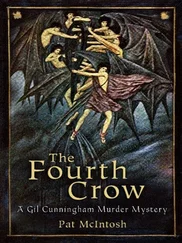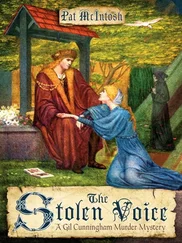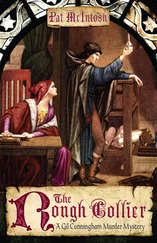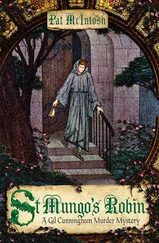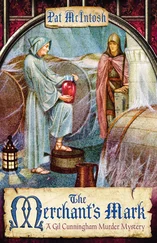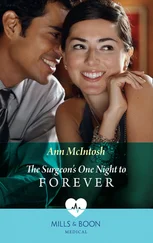Pat McIntosh - The Harper's Quine
Здесь есть возможность читать онлайн «Pat McIntosh - The Harper's Quine» весь текст электронной книги совершенно бесплатно (целиком полную версию без сокращений). В некоторых случаях можно слушать аудио, скачать через торрент в формате fb2 и присутствует краткое содержание. Жанр: Исторический детектив, на английском языке. Описание произведения, (предисловие) а так же отзывы посетителей доступны на портале библиотеки ЛибКат.
- Название:The Harper's Quine
- Автор:
- Жанр:
- Год:неизвестен
- ISBN:нет данных
- Рейтинг книги:5 / 5. Голосов: 1
-
Избранное:Добавить в избранное
- Отзывы:
-
Ваша оценка:
- 100
- 1
- 2
- 3
- 4
- 5
The Harper's Quine: краткое содержание, описание и аннотация
Предлагаем к чтению аннотацию, описание, краткое содержание или предисловие (зависит от того, что написал сам автор книги «The Harper's Quine»). Если вы не нашли необходимую информацию о книге — напишите в комментариях, мы постараемся отыскать её.
The Harper's Quine — читать онлайн бесплатно полную книгу (весь текст) целиком
Ниже представлен текст книги, разбитый по страницам. Система сохранения места последней прочитанной страницы, позволяет с удобством читать онлайн бесплатно книгу «The Harper's Quine», без необходимости каждый раз заново искать на чём Вы остановились. Поставьте закладку, и сможете в любой момент перейти на страницу, на которой закончили чтение.
Интервал:
Закладка:
‘It is,’ he agreed. ‘Can I get a word with him, Kirsty?’
‘Oh, aye. He’s just breaking his fast. Will you wait, or interrupt him? Mind, he’s going out hawking in a wee bit.’
‘I’d best see him now. I need a decision.’
Agog, she led him up a wheel stair and into the subdean’s private closet, where James Henderson, red-faced and richly clad, was consuming cold roast meat with bannocks and new milk in front of a tapestry of hunting scenes.
‘Here’s Maister Cunningham for you,’ she proclaimed, ‘and it’ll no wait.’
‘St Mungo’s bones!’ exclaimed Canon Henderson. ‘What ails ye, Gil? Will ye take bannocks and milk?’
‘No, I thank you,’ said Gil with regret. ‘I’ve come to report a corpse in the Fergus Aisle. I found her just now.,
‘A corp!’ said Kirsty. ‘Who is it? What’s come to her? And at May-tide, too!’
‘A corpse,’ repeated Canon Henderson. ‘In the Archbishop’s new work? You mean a fresh corpse?’
‘Stabbed, last night, I would say, sir.’
‘Save us! I never heard anything last night,’ said Kirsty.
‘Is she from the Chanonry? A dependant, a servant? Her household must be notified.’
‘I think she’s one of the harper’s singers.’
‘Oh, a musician,’ said the sub-dean distastefully. ‘If she belongs down the town then it’s hardly proper for her to stay here. Maybe the Greyfriars — ‘
‘I thought so too.’
‘And Gil …’ The sub-dean hesitated, staring at the woven heron, caught in the moment of its death. He tapped his teeth with a chewed fingernail. ‘How did she die? Stabbed, you say? And on St Mungo’s land. I suppose we have a duty to look for the man responsible, even if she is a minstrel.’
‘We do,’ agreed Gil.
‘Aye, we do!’ said Kirsty. ‘Or we’ll none of us can sleep easy, thinking we’ll get murdered in our beds.’
‘Be silent, woman!’ ordered Canon Henderson.
‘Well enough for you,’ retorted Kirsty. ‘It’s me that’s at the side nearest the door!’
‘Is there anyone else I should report this to?’ Gil asked.
‘No,’ said the sub-dean hastily. ‘Just get her moved. Maybe the mason’s men can bear her to the Greyfriars. See to it, Gil, will you? And as for finding the malefactor, you’d be well placed to make a start. After all, you found her. I’ll speak to your uncle — perhaps at Chapter.’
Gil, seeing himself out to the sound of a blossoming domestic quarrel, did not take the direct path to the building site, but cut across the slope of the kirkyard to the stand of tall trees opposite the door of the lower church.
He made his way through the trees, scuffing the bluebells aside with his feet, many thoughts jostling in his head. It seemed he would be spending more time away from his books. Surely it should not feel as if he had been let off his leash. And when he finally became a priest, scenes such as this morning’s would become part of his existence, both the encounter with a recent corpse and the slice of home life he had just witnessed. The corpse he could cope with, he felt. One would usually have some warning, and there were procedures to be gone through, shriving, conditional absolution, prayers for the dead. One would know what to do. But what could one do about the other matter — the behaviour of what his uncle referred to, with dry legal humour, as The concordance of debauched canons. Nothing to do with Gratian’s classic text, of course.
He sniffed the green smell of the new leaves he was trampling, and tried to imagine himself, a senior figure in the Church, taking a servant to his bed like Canon Henderson, or setting up a woman of his own class as an acknowledged mistress with her own home, like Canon Dalgliesh. The image would not stay before him. Instead he saw his uncle, whom he knew he would resemble closely in thirty years’ time, and the scholar who had taught him logic at the University.
He looked about him, a little blankly. What was it Aristotle said about incongruity? The dead woman was a thing out of place; the harp key the trebles had found was another. There was, of course, a significant and bawdy double meaning attached to the object, but the chanter appeared to have discarded it as an irrelevance, rather than as a source of corruption.
He began to search more carefully under the bluebells, and was rewarded by a lost scrip, empty, a broken wooden beaker and one shoe. He was casting about nearer the church, trying to judge where the implement might have landed after the chanter threw it this way, when a blackbird flew up, scolding, and something snored behind him.
Wild boar! he thought as he whirled, drawing his sword. Then it dawned on him that there could be no wild boar in St Mungo’s kirkyard. Feeling slightly foolish, he stared round under the trees, sword in hand, waiting for the sound to be repeated. There it was again — over there among those bushes. He made his way cautiously through the long grass, and carefully parted the leaves with the point of his blade.
The mason’s men, three sturdy fellows in aprons, were gathered inside the walls of the chapel, standing on the muddy grass staring down at the corpse. Their master was issuing instructions about a hurdle when Gil climbed the scaffolding.
‘Ah — maister lawyer,’ he said, breaking off. ‘What have you learned? Where does she go home?’
‘Greyfriars,’ said Gil. ‘But we’ll need another hurdle.’
The three men turned to stare at him. One was squat and grizzled, one was fair and lanky, and the middle one was the journeyman called Thomas, who had argued with a merchant’s son in the High Street. So her father is the master mason? he thought.
‘Is your missing laddie about fifteen, wearing striped hose?’
Thomas swallowed.
‘Aye,’ he said. ‘Rare proud of them he is, too. What d’ye mean, a hurdle, maister? Is he — have you — ?’
‘I’ve found him,’ said Gil.
The boy was not dead. He lay on his face in a little huddle under the bushes, blood caked on a vicious wound on the top of his head, breathing with the stertorous snores that had attracted Gil’s attention. There was no other mark on him, but he was very cold.
‘It needs that we nurse him,’ said Maistre Pierre. ‘I have heard men breathe so before.’ He looked round, to where two of the men were approaching with a hurdle, and held up one large hand. ‘A moment, Wattie. Maister Cunningham, do you see something strange?’
‘Very strange,’ agreed Gil. ‘I wondered if you would see it. There is no sign of the man who struck him that blow. I followed the boy’s own tracks into the bushes. Someone else has run by him, a couple of paces that way, but hardly close enough to hit him like that.’
‘You must stand still to strike so hard a blow,’ said the mason thoughtfully. He scratched the back of his head, pushing the hat forward. ‘I have seen a man walk away after he was struck and fall down later. Perhaps he was not struck here.’
‘Can we move him, maister?’ demanded the grizzled Wattie. ‘If he’s no deid yet, he soon will be, laid out here in the dew like that.’
‘Aye, take him up, Wattie,’ said his master, straightening the hat. ‘You and Thomas, bear him to our house. Send Luke ahead to warn the household, and bid him fetch a priest,’ he added. ‘He must be shriven. Ah, poor laddie.’
The limp form was lifted on to the hurdle. Gil, on sudden impulse of pity, pulled off his short gown and tucked it round the boy.
‘His bonnet’s here,’ said Wattie, lifting it. ‘It was under him.’
‘Give me,’ said the mason. ‘Has he been robbed?’
‘Two pennies and a black plack in his purse,’ reported Wattie, ‘and he’s still wearing this.’ He pulled aside the folds of the gown to display a cheap brooch, the kind exchanged by sweethearts, pinned to the lad’s doublet. ‘His lass gave him that at St Mungo’s Fair.’
Читать дальшеИнтервал:
Закладка:
Похожие книги на «The Harper's Quine»
Представляем Вашему вниманию похожие книги на «The Harper's Quine» списком для выбора. Мы отобрали схожую по названию и смыслу литературу в надежде предоставить читателям больше вариантов отыскать новые, интересные, ещё непрочитанные произведения.
Обсуждение, отзывы о книге «The Harper's Quine» и просто собственные мнения читателей. Оставьте ваши комментарии, напишите, что Вы думаете о произведении, его смысле или главных героях. Укажите что конкретно понравилось, а что нет, и почему Вы так считаете.


